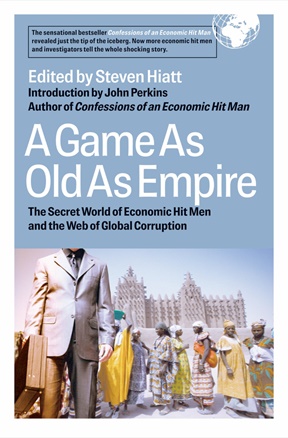Description
John Perkins’ controversial and bestselling exposé, Confessions of an Economic Hit Man, revealed for the first time the secret world of economic hit men (EHMs). But Perkins’ Confessions contained only a small piece of this sinister puzzle. The full story is far bigger, deeper, and darker than Perkins’ personal account revealed. Here other EHMs, journalists, and investigators join Perkins to tell their own stories, providing the first probing and expansive look into this pervasive web of systematic corruption.
With chapters spotlighting how specific countries around the globe have been subverted, A Game As Old As Empire uncovers the inner workings of the institutions behind these economic manipulations. The contributors detail concrete examples of how the “economic hit man game” is still being played: an officer of an offshore bank hiding hundreds of millions of dollars in stolen money, IMF advisers slashing Ghana’s education and health programs, a mercenary defending a European oil company in Nigeria, a consultant rewriting Iraqi oil law, and executives financing warlords to secure supplies of coltan ore in Congo. Together they show how this system of corruption and plunder operates in real life, and reveal the price that the rest of the world must pay as a result.
Most important, A Game As Old As Empire connects the dots, showing how the various pieces of this system come together to create the world’s first truly global empire.
About the Author
Steven Hiatt is an editor and writer who has worked for Apple Computer and Stanford Research Institute. He is the editor (with Mike Davis) of Fire in the Hearth: The Radical Politics of Place in America and is president of Editcetera, a cooperative of publishing professionals.
Ellen Augustine’s passion to create a just, peaceful, and sustainable world has led her to run for U.S. Congress and found/cofound four nonprofits focusing on media violence, mentoring at-risk youth, citizen diplomacy, and environmental restoration. She co-authored (as Ellen Schwartz) Taking Back Our Lives in the Age of Corporate Dominance from an optimism that simultaneously recognizes the urgency of our times and the power of intention and conscious action. She currently speaks on “Stories of Hope”: profiles of people who are creating businesses that increase profits by being eco-friendly, communi- ties and schools that nurture and sustain us, and initiatives that revitalize our environment (www.storiesof hope.us). She has been a voice for the common good—balancing the present and future needs of people and the planet in all decisions—on numerous radio and television shows, and in magazines such as Utne Reader. She has served on several nonprofit boards, including the National Women’s Political Caucus and the Sierra Club.
Following a varied career in industry and technical education, Steve Berkman joined the World Bank’s Africa Region Group in 1983. Hired to provide advice and assistance on capacity-building components for Bank-funded projects, he worked in twenty-one countries. Within a few years, he realized that the Bank’s approach to economic development was a failure, but his attempts to convince management of the extent of the problem went unheeded until the arrival of President James Wolfensohn in 1995. Retiring in that same year, he was called back to the Bank from 1998 to 2002 to help establish the Anti- Corruption and Fraud Investigation Unit and was a lead investigator on a number of cases. Since 2002 he has provided assistance to the U.S. Senate Committee on Foreign Relations on legislation calling for reform of the multilateral development banks and Senate consideration of the United Nations Convention Against Corruption. He is currently finishing a manuscript on the World Bank that provides an inside look at the Bank’s management, its lending operations, and the theft of billions of dollars from its lending portfolio. He lives in Leesburg, Virginia.
The English novelist Somerset Maugham famously described Monaco, the Mediterranean tax haven, as a “sunny place for shady people.” In the mid- 1980s, economist John Christensen returned to Jersey, a not-so-sunny place for shady people in the English Channel, to investigate how these offshore tax havens work. During the boom years of financial deregulation he worked as a trust and company administrator and as economic adviser to the island’s government. Though committed to principles of fair trade and social justice, he became involved in a globalized offshore financial industry that facilitates capital flight, tax evasion, and money laundering. In 1998 he resigned from his post on Jersey, moved with his family to the UK, and became a founder member of a campaign to highlight how tax havens cause poverty. He currently directs the International Secretariat of the Tax Justice Network (www. taxjustice.net).
S.C. Gwynne is executive editor of Texas Monthly, having previously been a correspondent for Time magazine. After receiving a master’s degree from Johns Hopkins University in 1977, he was awarded a teaching fellowship in the writing seminars program under novelist John Barth at Johns Hopkins. But his writing career bracketed a five-year career managing international loan portfolios in the Middle East, North Africa, and Asia, first for Cleveland Trust and later in the Hong Kong office of First Interstat
